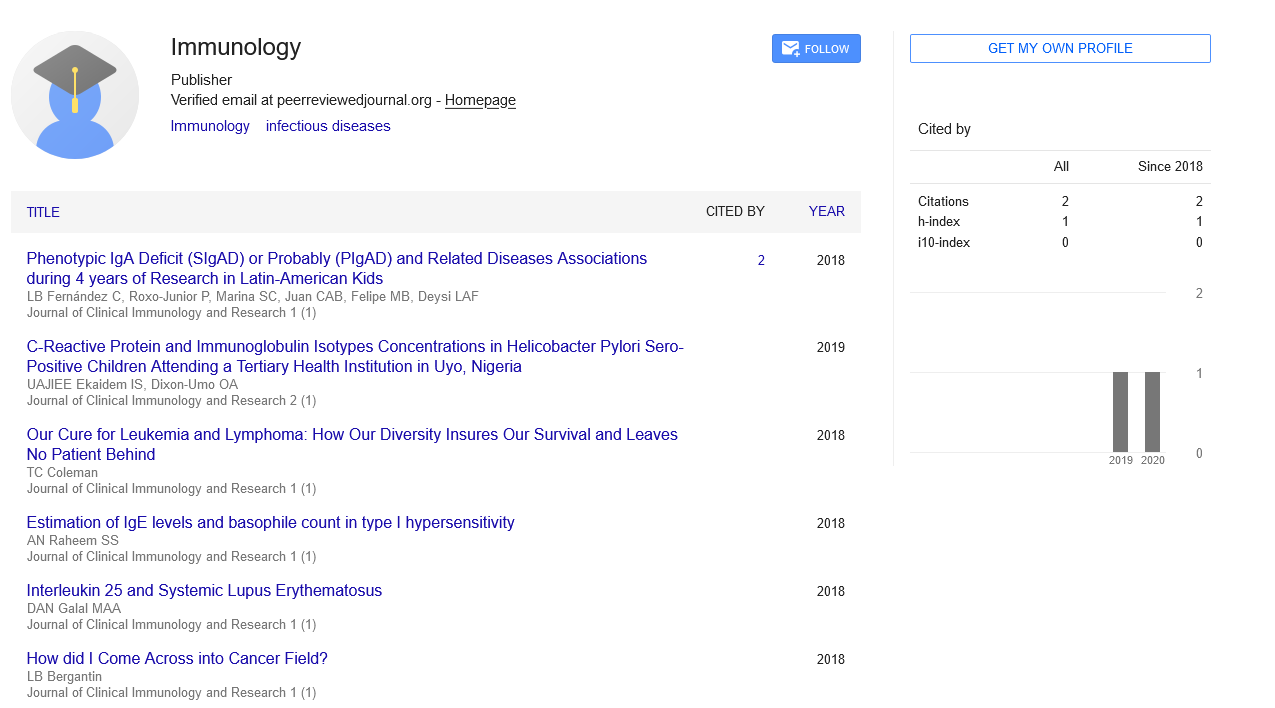Commentary, J Clin Immunol Res Vol: 6 Issue: 3
Immunotherapy Advances in Solid Tumor Treatment: Mechanisms and Clinical Outcomes
Yuhi Richai*
1Department of Metabolic Cell Signalling Research, University of Nuclear Medicine and Allied Sciences, New Delhi, India
*Corresponding Author: Yuhi Richai,
Department of Metabolic Cell Signalling
Research, University of Nuclear Medicine and Allied Sciences, New Delhi, India
E-mail: richaiyuhi42@gmail.com
Received date: 02 September, 2023, Manuscript No. JCIR-23-116293;
Editor assigned date: 04 September, 2023, PreQC No. JCIR-23-116293 (PQ);
Reviewed date: 18 September, 2023, QC No. JCIR-23-116293;
Revised date: 25 September, 2023, Manuscript No. JCIR-23-116293 (R);
Published date: 05 October, 2023, DOI: 10.4172/JCIR.100086.
Citation: Richai Y (2023) Immunotherapy Advances in Solid Tumor Treatment: Mechanisms and Clinical Outcomes. J Clin Immunol Res 6:3.
Description
Immunotherapy has transformed the solid tumor treatment, offering new ways and improved outcomes for patients. The comprehensive exploration of the mechanisms underlying immunotherapies, including checkpoint inhibitors, adoptive cell therapies are the combination strategies, while highlighting the clinical outcomes that have reshaped cancer treatment. Solid tumors represent a significant challenge in oncology, often presenting with advanced stages and limited treatment options. The emergence of immunotherapy has revolutionized cancer treatment by harnessing the power of the immune system to target cancer cells.
Checkpoint inhibitors
Checkpoint inhibitors have emerged as a cornerstone of immunotherapy, representing a breakthrough in the field of oncology. These therapies target specific immune checkpoints to release the brakes on immune cells, enabling them to mount an effective antitumor response.
Mechanisms: Checkpoint inhibitors, such as anti-PD-1, anti-PDL1, and anti-CTLA-4 antibodies, work by blocking the interaction between immune checkpoint proteins and their ligands. This blockade reactivates T cells, allowing them to recognize and attack cancer cells.
Clinical outcomes: The clinical impact of checkpoint inhibitors has been profound, with durable responses observed in various solid tumor types, including melanoma, Non-Small Cell Lung Cancer (NSCLC), and renal cell carcinoma. A subset of patients experiences long-lasting remissions, often with fewer side effects compared to traditional chemotherapy.
Adoptive cell therapies: Adoptive cell therapies represent a category of immunotherapies that involve the isolation and modification of a patient's immune cells to enhance their anticancer activity before reinfusion.
CAR T-cell therapy: Chimeric Antigen Receptor (CAR) T-cell therapy involves genetically engineering a patient's T cells to express CARs, which target specific tumor antigens. This approach has demonstrated remarkable efficacy in hematologic malignancies, particularly acute lymphoblastic leukemia.
Tumor-Infiltrating Lymphocytes (TILs): TIL therapy entails the extraction of T cells from a patient's tumor, their expansion in vitro, and their subsequent reintroduction into the patient. TIL therapy has shown results in treating metastatic melanoma.
Combination therapies
Combining immunotherapies with other treatment modalities, such as radiation therapy and targeted therapies, has been a focus of research to maximize therapeutic outcomes.
Enhancing immune response: Radiation therapy can synergize with immunotherapies by inducing the release of tumor antigens, thereby enhancing the immune response against cancer cells. This combination approach has shown results in multiple solid tumor types.
Targeted therapies: Combining immunotherapies with targeted therapies, such as tyrosine kinase inhibitors, has demonstrated potential in overcoming resistance mechanisms and improving clinical outcomes in specific patient populations.
Challenges and future directions
Despite the remarkable successes of immunotherapy, several challenges and avenues for further research persist:
Response variability: Not all patients respond to immunotherapies, highlighting the need for predictive biomarkers to identify likely responders.
Autoimmune side effects: Immune activation can lead to immunerelated Adverse Events (irAEs), necessitating close monitoring and management.
Resistance mechanisms: Tumors can develop resistance to immunotherapies, requiring the development of strategies to circumvent or overcome resistance.
Conclusion
Immunotherapy has ushered in a new era in the treatment of solid tumors, offering the potential for durable responses and improved quality of life for patients. Checkpoint inhibitors and adoptive cell therapies have emerged as transformative approaches, with ongoing research aimed at enhancing their efficacy and expanding their applicability. Combination therapies and the identification of predictive biomarkers hold the key to unlocking the full potential of immunotherapies. As the field continues to evolve, collaborative efforts among researchers, clinicians, and pharmaceutical companies will be pivotal in advancing the frontiers of immunotherapy and reshaping the landscape of solid tumor treatment. The remarkable clinical outcomes achieved thus far underscore the immense results of immunotherapy in solid tumor treatment, offering renewed hope for patients facing these challenging diseases.
 Spanish
Spanish  Chinese
Chinese  Russian
Russian  German
German  French
French  Japanese
Japanese  Portuguese
Portuguese  Hindi
Hindi 